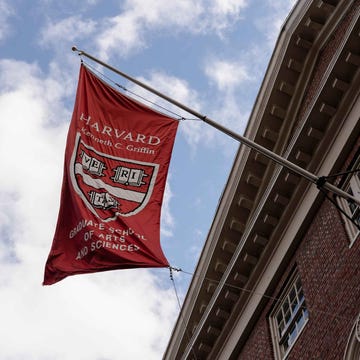In the first few months of President Donald Trump’s second administration, he has focused intently on Ivy League schools.
Throughout the 2024 presidential election, he campaigned on “fixing” higher education; as he said at one campaign event, “We are going to choke off the money to schools that aid the Marxist assault on our American heritage and on Western civilization itself. The days of subsidizing communist indoctrination in our colleges will soon be over.” At another, he said, “To every college president: Vanquish the radicals and take back our campuses for all of the normal students.”
In an attempt to force Ivy League schools to conform to administration policies, the Trump administration has begun systematically freezing funding, or threatening to withhold federal money in an effort to pressure schools to adhere to administration policies.
The administration’s first attack on these schools has come through the stated goal of fighting antisemitism on college campuses, yet they’ve made demands of Ivies that go far beyond combating hate speech and well into the idealogical and culture war arena. “They are using anti-antisemitism as a cloak,” MSNBC contributor Molly Jong-Fast said. “If this administration really cared about antisemitism, there’s a lot of stuff they could do. This is not about that.” As of this writing, only Yale and Dartmouth haven’t publicly been presented with any funding cuts or demands.
Here, a complete timeline of the Trump administration’s actions against Ivy League schools and their responses. We’ll be updating this regularly.
January 30: Trump signs an Executive Order aimed at campus antisemitism.
According to the White House, the new executive order “takes forceful and unprecedented steps to marshal all Federal resources to combat the explosion of anti-Semitism on our campuses and in our streets since October 7, 2023.” (October 7 references the Hamas attack on Israel, which sparked a new war in the region.)
February 3: The Justice Department launches “Task Force to Combat Anti-Semitism.”
“Anti-Semitism in any environment is repugnant to this Nation’s ideals,” said Senior Counsel to the Assistant Attorney General for Civil Rights Leo Terrell, in charge of the Task Force. “The Department takes seriously our responsibility to eradicate this hatred wherever it is found. The Task Force to Combat Anti-Semitism is the first step in giving life to President Trump’s renewed commitment to ending anti-Semitism in our schools.”
The task force “is motivated by one thing and one thing only: tackling antisemitism,” White House spokesman Kush Desai said, per the Wall Street Journal. “Antisemitic protesters inflicting violence and taking over entire college campus buildings is not only a crude display of bigotry against Jewish Americans, but entirely disruptive to the intellectual inquiry and research that federal funding of colleges is meant to support.”
Education Secretary Linda McMahon said in a recent interview: “These universities are taking federal funds. And so if you’re taking federal funds, then we want to make sure that you’re abiding by federal law.”
February 28: The task force announces initial list of ten schools.
Nearly a month after launching, the task force announced the first list of schools that would be the subject of their investigations: Columbia University; George Washington University; Harvard University; Johns Hopkins University; New York University; Northwestern University; the University of California, Los Angeles; the University of California, Berkeley; the University of Minnesota; and the University of Southern California.
Columbia and Harvard were, at first, the only two Ivy League schools on the list. Then, while not officially announced, per the New York Times, “The White House also zeroed in on another five schools — Brown University, Cornell University, Northwestern, the University of Pennsylvania and Princeton University,” adding four more Ivies to its focus. And, according to the WSJ, “Separately, at least 60 colleges and universities are under investigation by the Education Department’s Office for Civil Rights for their alleged inaction in protecting Jewish students and staff.”
March 7: Trump administration pauses around $400 million in federal funding to Columbia University.
“Universities must comply with all federal antidiscrimination laws if they are going to receive federal funding,” Education Secretary Linda McMahon said in a statement. “Columbia has abandoned that obligation to Jewish students studying on its campus.”
March 17: Dartmouth hires Matt Raymer, former chief counsel at the Republican National Committee, as the school’s general counsel.
Dartmouth president Sian Leah Beilock announced Matt Raymer would begin as senior vice president and general counsel. Raymer previously served as chief counsel at the Republican National Committee.
“Matt Raymer is a gifted lawyer and proud alumnus who brings to the general counsel’s office experience with the legal needs of large organizations with a national profile and a deep love and commitment to Dartmouth,” President Beilock said in a statement. “Matt will play a critical role in helping us understand and navigate the legal landscape surrounding higher education.”
Politico reported at the time of his hiring that “Raymer’s selection comes as Republicans dramatically escalate their attacks on higher education — training their ire on Ivy League institutions they’ve long accused of fostering liberalism and censoring conservatives. It’s left university leaders balancing a series of competing demands: preserving their relationships with an administration on which most rely for funding, defending free speech on campus and protecting non-citizen student activists Trump campaigned on deporting.”
March 19: The administration suspends $175 million in federal funding to the University of Pennsylvania.
The Penn decision was not rooted in allegations of campus antisemitism, rather it focused on the universities policies regarding transexual athletes. The White House said funding was being removed due to Penn’s “policies forcing women to compete with men in sports,” likely referencing trans athlete Lia Thomas, who competed on the university’s swim team.
March 19: Princeton University president pens OpEd in The Atlantic about the Trump administration’s “attack” on Columbia.
“The United States is home to the best collection of research universities in the world. Those universities have contributed tremendously to America’s prosperity, health, and security. They are magnets for outstanding talent from throughout the country and around the world,” Princeton president Christopher L. Eisgruber wrote. “The Trump administration’s recent attack on Columbia University puts all of that at risk, presenting the greatest threat to American universities since the Red Scare of the 1950s. Every American should be concerned.”
He wrote later in the piece: “The attack on Columbia is a radical threat to scholarly excellence and to America’s leadership in research. Universities and their leaders should speak up and litigate forcefully to protect their rights.” Read it in full, here.
March 21: Columbia concedes to Trump administration demands to regain funding.
Columbia University became the first school to agree to demands made by the Trump administration, including a ban on face masks during campus protests, a new definition of antisemitism, empowering 36 campus police officers to arrest students, and appointing a new senior vice provost with authority of the Middle Eastern, South Asian and African Studies departments, and the Center for Palestine Studies.
“Our response to the government agencies outlines the substantive work we’ve been doing over the last academic year to advance our mission, ensure uninterrupted academic activities, and make every student, faculty, and staff member safe and welcome on our campus,” Interim Columbia President Katrina Armstrong wrote.
In response, there was deep outrage from Columbia students, faculty, and alumni. “This is a shameful day in the history of Columbia,” Dr. Sheldon Pollock, a retired former chair of Columbia’s Middle Eastern Studies department, told the New York Times, adding that it would “endanger academic freedom, faculty governance and the excellence of the American university system.” Professor Michael Thaddeus, who works in the school’s math department, said Columbia’s choice to capitulate to the administration “strikes at the heart of academic freedom.”
March 25: Penn presidents writes about impact of loss of funding.
“Faculty across seven different schools received stop work orders last week on federally contracted research, amounting to approximately $175M,” J. Larry Jameson, Penn’s president, wrote in an open letter. “These contracts include research on preventing hospital-acquired infections, drug screening against deadly viruses, quantum computing, protections against chemical warfare, and student loan programs.”
Jameson added, “Federal funding freezes and cancellations jeopardize lifesaving and life-improving research, the loss of which will be felt by society and individuals far beyond our campus for years to come.”
March 28: Columbia’s interim president resigns.
Just a week after announcing a change to Columbia’s policies in response to Trump’s threats, Armstrong stepped down as interim president. Board of trustees co-chair Claire Shipman was appointed acting university president.
“Dr. Armstrong accepted the role of interim president at a time of great uncertainty for the University and worked tirelessly to promote the interests of our community,” board of trustees co-chair David Greenwald said in the statement when the decision was announced. “Katrina has always given her heart and soul to Columbia. We appreciate her service and look forward to her continued contributions to the University.”
March 31: The administration announces a review of $9 billion in federal funding to Harvard.
Harvard became the third Ivy League school to be targeted by Trump, with his administration announcing at the end of March it would be reviewing $256 million in federal contracts, and $8.7 billion in “multiyear grant commitments.”
“While Harvard’s recent actions to curb institutionalized antisemitism — though long overdue — are welcome, there is much more that the university must do to retain the privilege of receiving federal taxpayers’ hard-earned dollars,” Josh Gruenbaum, a senior official at the General Services Administration, said. He added, “This administration has proven that we will take swift action to hold institutions accountable if they allow antisemitism to fester…We will not hesitate to act if Harvard fails to do so.”
April 1: The administration freezes around $210 million of Princeton’s federal funding.
Princeton University announced that the government had frozen several dozen research grants to the school, including from NASA, the Defense Department, and the Energy Department.
“We are committed to fighting antisemitism and all forms of discrimination, and we will cooperate with the government in combating antisemitism. Princeton will also vigorously defend academic freedom and the due process rights of this university,” Princeton President Christopher L. Eisgruber said in a statement. In an interview with Bloomberg, he called the demands put on federal funding “deeply worrisome.”
April 3: Trump administration announces freeze on around $510 million in funding to Brown University.
Brown joined its Ivy League peers in April as the latest school to lose federal funding, to the tune of half a billion, over alleged antisemitism and Diversity, Equity, and Inclusion initiatives.
April 8: The Trump administration freezes more than $1 billion in funding for Cornell.
Cornell became the latest Ivy League to be the subject of a funding freeze, with “grants from and contracts with the Departments of Agriculture, Defense, Education and Health and Human Services” all paused, according to the New York Times.
That day, Cornell president Michael I. Kotlikoff, provost Kavita Bala, and provost for medical affairs Robert A. Harrinton wrote in a joint message to campus, “Cornell is aware of media reports suggesting that more than $1 billion in federal grants have been frozen. While we have not received information that would confirm this figure, earlier today Cornell received more than 75 stop work orders from the Department of Defense related to research that is profoundly significant to American national defense, cybersecurity, and health.”
They added, “Cornell is a land-grant university that serves New York state and the nation. The university has worked diligently to create an environment where all individuals and viewpoints are protected and respected. We are committed to working with our federal partners to continue the contributions made by our scientists and scholars.”
The same day, Northwestern had funding frozen—the first non-Ivy League institution to be targeted by the Trump administration.
April 8: Princeton announces it will not concede to Trump administration pressure.
“We make our decisions at Princeton based on our values and our principles,” President Eisgruber told NPR. “You know, I don't want to pass judgment on what other universities do. These are extraordinarily difficult circumstances. But we're going to stand strong for our values at Princeton, and I think we have a community that is united behind those values.”
When NPR host asked if that means they were not willing to make any concessions, Eisgruber replied, “We believe it’s important to defend academic freedom, and that’s not something that can be compromised.”
April 10: The Wall Street Journal reports that the Trump admin is seeking a “consent decree”—a.k.a. federal oversight of Columbia.
In an exclusive, the WSJ reported, “The Trump administration is planning to pursue a legal arrangement that would put Columbia University into a consent decree, according to people familiar with the matter, an extraordinary step that could significantly escalate the pressure on the school as it battles for federal funding.”
The report explains: “A consent decree, which can last for years, would give a federal judge responsibility for ensuring Columbia changes its practices along lines laid out by the federal government. If such a decree is in place, Columbia would have to comply with it. If a judge determines the school is out of compliance, it could be held in contempt of court, punishable by penalties including fines.”
Columbia would have to agree to enter a “consent decree” for it to take effect. “The university remains in active dialogue with the federal government to restore its critical research funding,” a spokesperson for the university told the WSJ.
April 11: Trump administration issues a longer list of demands for Harvard.
The demands included “governance and leadership reforms,” “merit-based” hiring and admissions reforms, and discontinuation of DEI policies, among others.
“Harvard has in recent years failed to live up to both the intellectual and civil rights conditions that justify federal investment. But we appreciate your expression of commitment to repairing those failures and welcome your collaboration in restoring the University to its promise. We therefore present the below provisions as the basis for an agreement in principle that will maintain Harvard’s financial relationship with the federal government,” Gruenbaum of the General Services Administration wrote. (Read the full letter here.)
April 11: The Department of Energy (DOE) cuts over $400 million in research grants.
In a press release, the DOE said it will “limit financial support” of research funding. “The purpose of Department of Energy funding to colleges and universities is to support scientific research – not foot the bill for administrative costs and facility upgrades,” U.S. Secretary of Energy Chris Wright said. “With President Trump’s leadership, we are ensuring every dollar of taxpayer funding is being used efficiently to support research and innovation – saving millions for the American people.”
April 13: Brown and other universities sue the Department of Energy.
Alongside eight universities, the Association of American Universities, the American Council on Education and the Association of Public and Land-Grant Universities, Brown filed a lawsuit in an attempt to halt the Energy Department’s funding cuts.
The DOE’s cuts will “have an immediate and dire impact on critical energy, physical sciences and engineering research nationwide,” the Association of American Universities said in a statement. “It also sets a very dangerous precedent that could be used to undermine federal investments in research at many other federal agencies.”
April 14: Harvard announces it will not comply with the administration’s demands in exchange for federal funding.
In response to the Trump administration’s “unprecedented demands,” Harvard president Alan M. Garber announced that Harvard would not be changing any of its policies.
“The administration’s prescription goes beyond the power of the federal government,” Garber wrote in a message to the Harvard community. “It violates Harvard’s First Amendment rights and exceeds the statutory limits of the government’s authority under Title VI. And it threatens our values as a private institution devoted to the pursuit, production, and dissemination of knowledge. No government—regardless of which party is in power—should dictate what private universities can teach, whom they can admit and hire, and which areas of study and inquiry they can pursue.”
Politico noted that “Harvard’s response, in the face of a threat of losing billions in federal grants, represented a rare show of resistance to efforts by President Donald Trump’s administration to punish major institutions and law firms he views as hostile.” The loss of federal funding will impact not just Harvard, but its affiliated institutions, including Boston Children’s Hospital and Mass General Brigham.
Many were quick to praise Harvard’s decision, including former president Barack Obama, a Harvard Law School alum. “Harvard has set an example for other higher-ed institutions – rejecting an unlawful and ham-handed attempt to stifle academic freedom, while taking concrete steps to make sure all students at Harvard can benefit from an environment of intellectual inquiry, rigorous debate and mutual respect. Let’s hope other institutions follow suit,” he posted on social media.
April 14: The task force announces it will block Harvard from $2.2 billion in grants.
The Trump administration’s antisemitism task force fired back at Harvard the next day, saying in a statement, “Harvard’s statement today reinforces the troubling entitlement mindset that is endemic in our nation's most prestigious universities and colleges – that federal investment does not come with the responsibility to uphold civil rights laws,” and confirming a freeze “on $2.2 billion in multi-year grants and $60M in multi-year contract value.”
Harvard’s lawyers say the administration’s demands “invade university freedoms.” “The university will not surrender its independence or relinquish its constitutional rights,” the lawyers wrote. “Neither Harvard nor any other private university can allow itself to be taken over by the federal government.”
April 15: Trump threatens Harvard’s tax-exempt status.
After Harvard announced it would not be complying with the administration’s demands, Trump posted on social media, “Perhaps Harvard should lose its Tax Exempt Status and be Taxed as a Political Entity if it keeps pushing political, ideological, and terrorist inspired/supporting “Sickness?” Remember, Tax Exempt Status is totally contingent on acting in the PUBLIC INTEREST!”
Later in the day, White House Press Secretary Karoline Leavitt said Trump “wants to see Harvard apologize, and Harvard should apologize.”
Soon after, the Treasury Department and the Internal Revenue Service (IRS) began making plans to rescind Harvard’s tax-exempt status.
April 22: Harvard sues the Trump administration.
Harvard University filed a lawsuit against the administration, arguing the funding freeze “is unlawful and beyond the government’s authority.”
“The consequences of the government’s overreach will be severe and long-lasting,” Harvard president Alan M. Garber wrote in a letter explaining the suit. “Research that the government has put in jeopardy includes efforts to improve the prospects of children who survive cancer, to understand at the molecular level how cancer spreads throughout the body, to predict the spread of infectious disease outbreaks, and to ease the pain of soldiers wounded on the battlefield.”
In response, the White House said, “Taxpayer funds are a privilege, and Harvard fails to meet the basic conditions required to access that privilege.”
Emily Burack (she/her) is the Senior News Editor for Town & Country, where she covers entertainment, celebrities, the royals, and a wide range of other topics. Before joining T&C, she was the deputy managing editor at Hey Alma, a Jewish culture site. Follow her @emburack on Twitter and Instagram.
















